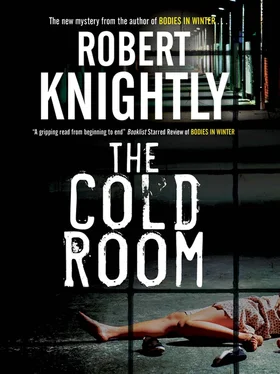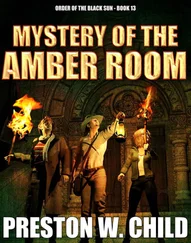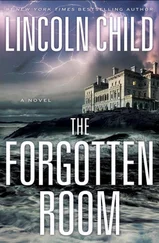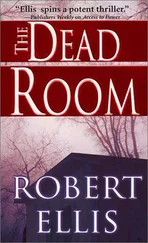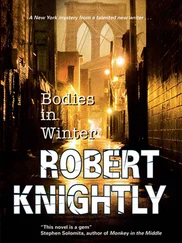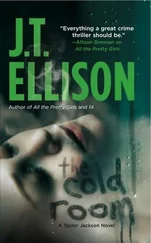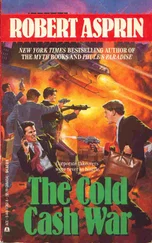Robert Knightly - The cold room
Здесь есть возможность читать онлайн «Robert Knightly - The cold room» весь текст электронной книги совершенно бесплатно (целиком полную версию без сокращений). В некоторых случаях можно слушать аудио, скачать через торрент в формате fb2 и присутствует краткое содержание. Жанр: Полицейский детектив, на английском языке. Описание произведения, (предисловие) а так же отзывы посетителей доступны на портале библиотеки ЛибКат.
- Название:The cold room
- Автор:
- Жанр:
- Год:неизвестен
- ISBN:нет данных
- Рейтинг книги:3 / 5. Голосов: 1
-
Избранное:Добавить в избранное
- Отзывы:
-
Ваша оценка:
- 60
- 1
- 2
- 3
- 4
- 5
The cold room: краткое содержание, описание и аннотация
Предлагаем к чтению аннотацию, описание, краткое содержание или предисловие (зависит от того, что написал сам автор книги «The cold room»). Если вы не нашли необходимую информацию о книге — напишите в комментариях, мы постараемся отыскать её.
The cold room — читать онлайн бесплатно полную книгу (весь текст) целиком
Ниже представлен текст книги, разбитый по страницам. Система сохранения места последней прочитанной страницы, позволяет с удобством читать онлайн бесплатно книгу «The cold room», без необходимости каждый раз заново искать на чём Вы остановились. Поставьте закладку, и сможете в любой момент перейти на страницу, на которой закончили чтение.
Интервал:
Закладка:
As it turned out, the Portolas lived in a splendid townhouse across the street from Riverside Park, making them far easier to identify and track than if I’d found them living in one of the many high-rise warrens to the east. And then there was Riverside Park itself, the perfect location for a long-term surveillance. In addition to the pedestrians on its winding paths and the traffic flowing north-south along the West Side Highway, there were groves of trees, dense shrubbery and a huge outcropping of bedrock set far enough away from the townhouse to make it unlikely that I would be spotted.
I settled down on a small ledge about halfway to the top of a jagged boulder, sliding out of my backpack, then fishing inside for the container of coffee, fried-egg sandwich and bottle of water I’d purchased at a deli on Broadway. Finally, I removed a small pair of binoculars, settling the strap around my neck.
The atmosphere around me was gray with haze, even at seven thirty in the morning, the air humid enough to virtually guarantee rainfall later in the day. Still, the park was busy, not with strollers who would come later, but with serious joggers, bikers, skateboarders and power walkers. I watched a young woman pass by. She pushed a three-wheeled stroller with extra long handles and sweat dripped from every pore in her body. A border collie trotted alongside the stroller, its tongue hanging out of its mouth, its breath coming in short pants. The dog’s head swung in my direction as it passed, looking not at me, or even at my sandwich, but at the bottle of water at my feet.
I pressed the binoculars to my eyes and made a quick sweep of the Portola townhouse. The four-story building, with its limestone facade, attic dormer and mansard roof, was typical of the row houses on Riverside Drive. The front was bowed, from the second through the fourth floors, and the main entrance, a narrow archway leading to an elaborate, wrought-iron storm door, was set almost at street level. At minimum, the house, even if the interior had been trashed, was worth a cool five million. And if it had been decently preserved or lovingly restored, the price might be fifty percent higher. I left the binoculars to dangle at the end of their strap and went to work on my sandwich. The Portola family wealth was not something I could ignore. Should one or more be arrested, their dream team would be top-notch and my every move would be carefully examined by attorneys who could recite the Constitution backwards in Sanskrit. Over the past twenty years, the Supreme Court has given cops a lot of room to maneuver, but the line was still invisible. If I crossed it, I was likely to find myself on the losing side at an evidence suppression hearing.
I finished the sandwich, chased it with the last of the coffee, and deposited the trash in a nearby trash basket. Of course, I had no idea when Domestic Solutions’ workers were due at their jobs. According to Giselle and Dimitri, a van carrying five or six women left the warehouse around seven thirty on Monday mornings. When any of them might arrive at a given address was far from certain. Still, as time passed, and eight became nine, then ten, I began to get antsy. I told myself that if nobody showed, it would be the priest’s fault, not mine. And if Sister Kassia had a beef, she could take it to Father Stan, maybe hear his confession. Arresting Mynka’s killer was my first priority. If the fate of these women was taken out of my hands, so much the better. My conscience was clean.
I was still fortifying my argument when a Ford Explorer double-parked in front of the Portola townhouse shortly before eleven. I raised the binoculars to my eyes. They were self-focusing and took several seconds to compensate for the soft edges generated by the fog. By the time I had a clear image, a woman had already exited the vehicle. I caught a glimpse of her red hair, contained beneath a white hairnet, and of a blue skirt and a white blouse. Then she was gone and the door closed behind her.
I shifted quickly to the Ford’s driver and found her sitting with her head turned away from me. But I didn’t need to see her face to know that we’d met before. The fire-red hair was a dead giveaway. Welcome to the conspiracy. As the SUV pulled away, I wrote down the license plate number. Then I closed my eyes and said a little prayer. Not to the God who lay in the Jerusalem dust, nearly broken by his own cross, but to the God who rained fire and brimstone on those wicked kingdoms, Sodom and Gomorrah. I could put the red-headed woman in the warehouse when Barsakov was killed. She was the key to pinning the murder on Aslan.
At eleven thirty, I moved a hundred yards closer to the Portola home. By chance, the door to the Portola residence swung out twenty minutes later and three people emerged: a middle-aged woman, a man in his twenties and a teenaged boy.
I slid the backpack over my shoulders and headed for the nearest exit, fifty yards to the north. Again, I got lucky. The trio also headed north, until they reached 86th street where they turned east. By that time, I’d exited the park. Tails are easily maintained in Manhattan. There are always pedestrians about and people generally mind their own business. The Portolas, for example, never looked back, not once. They didn’t speak to each other, either, content to maintain a steady pace until they reached the doors of a well-known French restaurant, L’Heures, on the east side of Columbus Avenue. I watched them go inside, then headed for a Turkish restaurant called Ishtan on the other side of the street. Ishtan had an outdoor cafe with a perfect view of L’Heures.
I was just finishing my second cup of espresso when the Portolas emerged, followed closely by a man wearing a cummerbund, a starched white shirt and a thin black tie. Obviously a restaurant employee, he engaged the woman in conversation for several minutes, his manner clearly apologetic.
As I brought the binoculars to my eyes, taking advantage of the family’s preoccupation, I felt my heart turn to stone and my world shrink down to these three people. The women of Domestic Solutions, Bill Sarney, Hansen Linde, Drew Millard, even Adele — banished one and all to some anonymous patch of neurons in the recesses of my brain.
The woman was taller than either of her sons. Too blond to be natural, her hair curled in a tight line almost to her shoulders where it hung stiffly, every strand in place. Her cheekbones were very high, her nose short and straight, and while her mouth was naturally full, she’d thickened her lips with a heavy layer of pink lipstick. The make-up on her cheeks was just a bit too thick as well, though it failed to conceal a narrow line of acne-pitted skin beneath her cheekbones.
The older boy’s expression was more bemused than annoyed. He stood to one side with both hands in the pockets of his off-white linen trousers. Although his features were much softer, his resemblance to the woman was evident in his fleshy mouth and his heart-shaped face. Perhaps in an effort to blur that resemblance, he’d grown a skimpy beard and a mustache, neither of which was thick enough to conceal the pale flesh beneath. As I watched, his hand fluttered up to play with an earring, an enamel rainbow, which hung from his left ear.
The teenager had drawn the shortest straw from the gene pool. All three had weak chins, but his was concealed beneath a lower lip that he thrust forward as though in a permanent state of petulance. Meanwhile, his eyes were small and overhung by a heavy brow that only emphasized his receding jaw. The boy seemed uninterested in the ritual humiliation of the restaurant employee. He’d wandered a few yards away and was staring south at the oncoming traffic, his expression sullen, the tension in his cheeks, mouth and neck obvious at a glance. But I couldn’t find even a hint of cruelty in his look and it occurred to me that I was probably staring at the father of Mynka’s child. Not only was he closer to Mynka’s age than the man in his mid-twenties, he wasn’t gay.
Читать дальшеИнтервал:
Закладка:
Похожие книги на «The cold room»
Представляем Вашему вниманию похожие книги на «The cold room» списком для выбора. Мы отобрали схожую по названию и смыслу литературу в надежде предоставить читателям больше вариантов отыскать новые, интересные, ещё непрочитанные произведения.
Обсуждение, отзывы о книге «The cold room» и просто собственные мнения читателей. Оставьте ваши комментарии, напишите, что Вы думаете о произведении, его смысле или главных героях. Укажите что конкретно понравилось, а что нет, и почему Вы так считаете.
